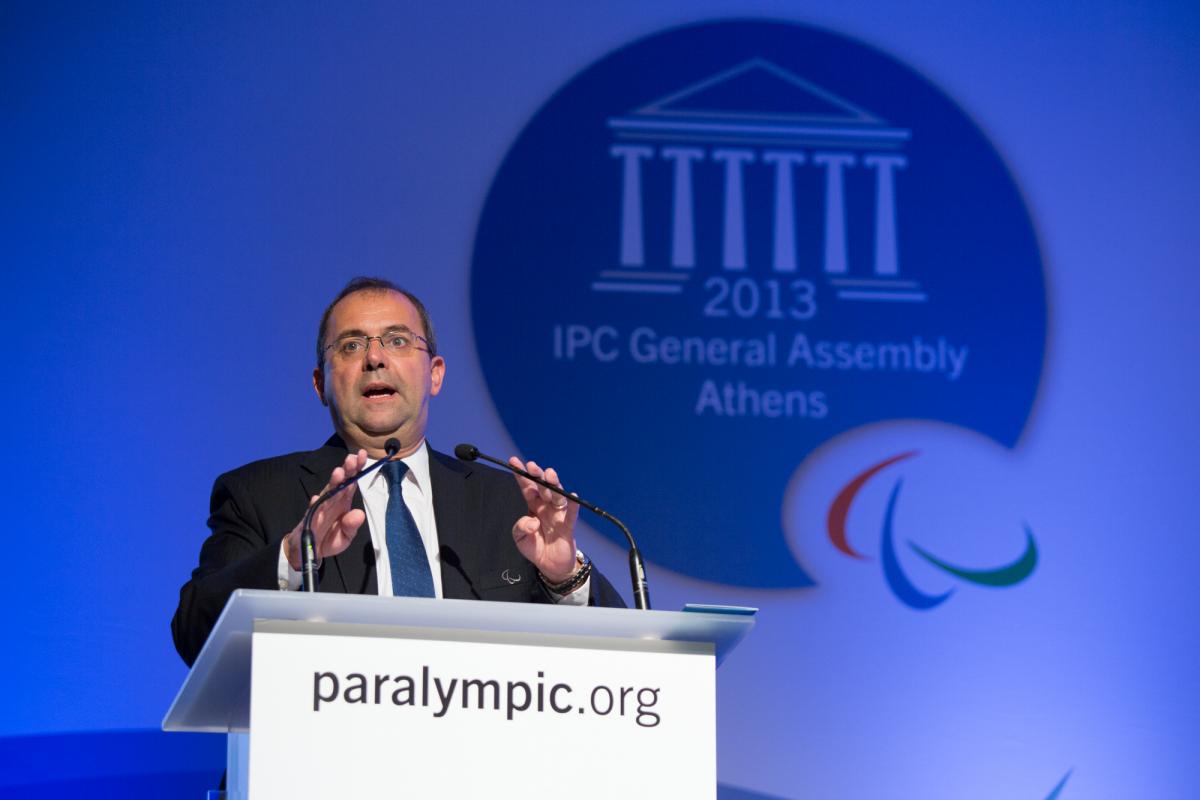IPC publishes strategic plans for nine Paralympic sports
The strategic plans for the nine IPC sports will make them stronger and in the long-term self-sustainable. 22 Nov 2013
IPC CEO Xavier Gonzalez presented the new IPC Paralympic sport strategic plans to the 2013 IPC General Assembly in Athens, Greece
“The overall priorities for all IPC sports are to develop multi-year competition plans, develop a strategy for each sport to increase their visibility through the development of a marketing and broadcast plan for each to capitalise on the IPC sports brand.”
On Friday (22 November) the International Paralympic Committee (IPC) published strategic plans for the nine Paralympic sports it acts as the International Federation for. The plans will strengthen the Paralympic Games programme, develop athlete opportunities and pathways and ensure greater visibility and promotion of the sports between the Paralympic Games.
The strategic plans for athletics, powerlifting, shooting and swimming cover 2013-2016, whilst ice sledge hockey, cross-country skiing, biathlon, alpine skiing and snowboard are covered from 2013-2018.
“The goal is for IPC sports to reach self-sustainability between 2017 and 2024. The timing will depend on the individual progress of the sport and the relationship with the Olympic equivalent International Federation, where relevant,” IPC Chief Executive Officer Xavier Gonzalez told delegates at the IPC General Assembly and Conference in Athens, Greece.
The plans were drawn up following a consultative process with Sport Technical Committees, sporting communities, IPC departments and external consultants. They cover six key areas: Paralympic Games and World Championships, athlete development, Paralympic brand, funding, organisational capacity, and strategic partnerships.
“The overall priorities for all IPC sports are to develop multi-year competition plans, develop a strategy for each sport to increase their visibility through the development of a marketing and broadcast plan for each to capitalise on the IPC sports brand,” Gonzalez revealed.
“We want to ensure that the sports stay athlete-focused, so another key aspect is integrating a feedback process to ensure that athletes’ voices are heard.
“It is also important to commit additional IPC general funding to invest in the IPC sports.”
Another key aspect of the plans is to develop classifiers and technical officials, strengthen the anti-doping and classification codes as well as foster relationships with Olympic International Federations.
The strategic plans for all sports will be driven by a common vision, mission and values.
“Our vision is to provide a platform for para-athletes to regularly practice and to showcase their ability to their full potential and to reach their sporting pinnacle and dreams,” explained Gonzalez.
“Our mission is to organise successful competitions as part of a stable calendar while encouraging participation and development at all levels and promoting the core values of the Paralympic Movement.”
He went on to list the core values. The IPC sports should be athlete-centred, equitable and promoting fair play, transparent and accountable, collaborative and engaging, and professional and ethical.
“Each sport will apply this vision, mission and values to their own context,” said Gonzalez.
At the IPC General Assembly in Torino in 2003, a motion was carried with the aim of supporting IPC sports to become more self-sustainable and eventually independent from the IPC.
The sports will undergo a two-stage process to achieve this goal: an early readiness stage, which includes full compliance with the criteria of the “scorecard system” as well as a solid relationship with the Olympic IF counterpart; and a readiness for separation stage in which the sport has shown consistency in budgets, competitions and overall management for at least two years.

 Facebook
Facebook
 Instagram
Instagram
 Twitter
Twitter
 Youtube
Youtube
